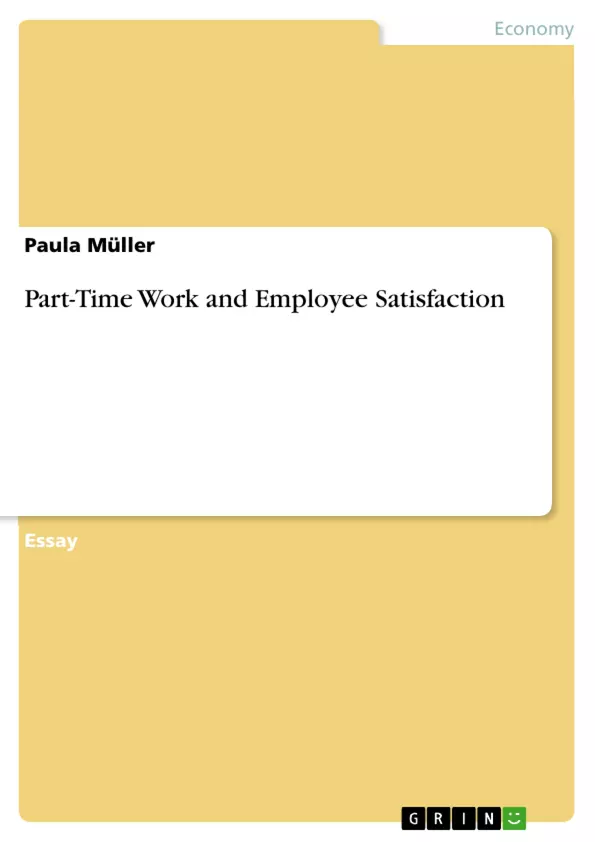Is part-time work the key to happier families? Empirical findings on job-satisfaction and personal happiness of part-time workers. Over the last decades, there has been a large increase of women in jobs and hence an increase in dual earner households. Consequently, a significantly higher amount of stress and pressure on men and women has been observed as it is difficult to combine the duties at work and at home which can reduce the overall quality of life and threat the work-life balance. For many people part-time work can be a solution to this problem especially in industrial nations.
By definition, an employee works part-time if he regularly works fewer hours than a comparable full-time employee. The number of hours varies from state to state and institution to institution. However, there has been an increase in part-time work also in traditionally full-time professions. In Europe about 32% of all women and 8% of men work part-time, though this rate is lowest in eastern countries and highest in northern and western countries. In the USA about 23% of employees work part-time.
But does part-time employment really increase the personal and work satisfaction? Why is the satisfaction higher or lower and what are benefits and disadvantages of part-time work? Moreover, what determines the satisfaction in part-time arrangements apart from influences of work and personal life?
Inhaltsverzeichnis (Table of Contents)
- Work satisfaction
- Personal satisfaction
- Aspects of the overall satisfaction
- Determinants
Zielsetzung und Themenschwerpunkte (Objectives and Key Themes)
This essay examines the impact of part-time work on job satisfaction and personal happiness, focusing on empirical findings to understand the relationship between reduced working hours and employee well-being. It delves into the reasons behind higher or lower satisfaction levels, exploring the advantages and disadvantages of part-time arrangements.
- The relationship between part-time work and job satisfaction
- The impact of part-time work on personal satisfaction and happiness
- The influence of individual demands and characteristics on satisfaction in part-time work
- The advantages and disadvantages of part-time work for both employees and employers
- The potential implications of part-time work on gender equality and career advancement
Zusammenfassung der Kapitel (Chapter Summaries)
- Work satisfaction: This section explores empirical findings on the relationship between part-time work and job satisfaction, highlighting the observed greater satisfaction in voluntary part-time work compared to full-time work. It also discusses the potential disadvantages of part-time work, such as lower income per hour, job insecurity, and exclusion from organizational activities.
- Personal satisfaction: This chapter focuses on the impact of part-time work on personal satisfaction and happiness. It examines the observed higher happiness at home and increased children satisfaction among part-time employees, suggesting that the flexibility of part-time arrangements can be beneficial for family life. However, the chapter also points out that there are no significant differences in role overload, stress levels, or mood between part-time and full-time employees in their private life.
- Aspects of the overall satisfaction: This section delves into the overall satisfaction experienced by part-time workers, exploring various aspects such as self-esteem, mood, and avoidance of office politics. It highlights the observed higher self-esteem among part-time workers and the potential for a more relaxed work environment, but also acknowledges the challenges related to communication problems and career advancement.
Schlüsselwörter (Keywords)
Part-time work, job satisfaction, personal satisfaction, work-life balance, dual-earner households, voluntary part-time work, involuntary part-time work, job insecurity, organizational exclusion, career advancement, gender equality, empirical findings.
Frequently Asked Questions
How does part-time work affect job satisfaction?
Empirical findings suggest that voluntary part-time work often leads to higher job satisfaction compared to full-time work, as it allows for a better balance between professional and personal life.
What are the main disadvantages of part-time employment?
Potential downsides include lower hourly income, reduced job security, and exclusion from important organizational activities or career advancement opportunities.
Does part-time work improve personal happiness at home?
Yes, studies often show higher levels of happiness at home and increased children's satisfaction among part-time employees due to greater flexibility for family duties.
Is there a difference in stress levels between part-time and full-time workers?
Interestingly, some research indicates no significant differences in overall role overload, mood, or stress levels in private life between the two groups, despite the reduced hours.
How common is part-time work in Europe and the USA?
In Europe, approximately 32% of women and 8% of men work part-time. In the USA, about 23% of all employees are in part-time arrangements.
- Quote paper
- Paula Müller (Author), 2014, Part-Time Work and Employee Satisfaction, Munich, GRIN Verlag, https://www.grin.com/document/450799



